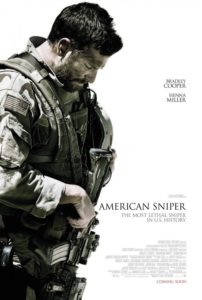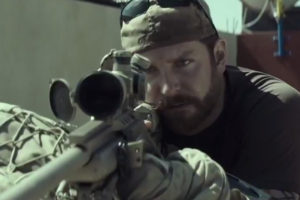 War is hell. So is this intensely polarizing movie. You either love American Sniper or hate it. I was one of the latter. Adapted from a biography of the same name, it is the story of U.S. Navy SEAL Chris Kyle (Bradley Cooper) who became a hero to many for being our most lethal sniper and killing the most Iraqis. My problem with the film is how the whole situation is portrayed as entirely black and white. Kyle and the Americans are the good guys, and every single Iraqi is evil. I am sure to the men and women who fought there, that was the perfect rationalization for what they did, but as storytelling goes, it leaves a lot to be desired.
War is hell. So is this intensely polarizing movie. You either love American Sniper or hate it. I was one of the latter. Adapted from a biography of the same name, it is the story of U.S. Navy SEAL Chris Kyle (Bradley Cooper) who became a hero to many for being our most lethal sniper and killing the most Iraqis. My problem with the film is how the whole situation is portrayed as entirely black and white. Kyle and the Americans are the good guys, and every single Iraqi is evil. I am sure to the men and women who fought there, that was the perfect rationalization for what they did, but as storytelling goes, it leaves a lot to be desired.
After seeing it, I was reminded of another American sniper movie, that did it in a less war wongerish (though somewhat hokey) fashion. Sergeant York was a 1941 film adaptation of another American hero’s biography. It too was the year’s top grossing film. And it also starred a man named Cooper (Gary) who won an Oscar for his portrayal of a country boy who becomes a national hero for taking out the enemy and saving his compatriots during World War I. The difference in the two films is that American Sniper never lets you see who Chris Kyle is, away from his SEAL sniper persona. When he returns home to his wife (Sienna Miller) and kids between his four deployments, there is opportunity to explore his character and the toll the war is taking on him that is alluded to but never shown.  You certainly don’t have any reason to like the guy. His issues with PTSD are mentioned almost as an aside near the end of the film.
You certainly don’t have any reason to like the guy. His issues with PTSD are mentioned almost as an aside near the end of the film.
I think super buff Bradley Cooper does all he can with a role that is pretty one dimensional. But Clint Eastwood’s direction leaves very little room for nuance as it beats the drums of patriotism and the justness of violence in war. And his jump from 9/11 to Iraq is pretty hard to take as narratives go. I think the audience for this film is veterans and service people who see their experience up there on the screen, and the “America. Love it or leave it” kind of patriots. I truly appreciate the sacrifice of our service men and women, but this story and the telling of it ring false and seem to justify America’s perpetual war stance. I’d say skip it.
(I knew going in that this was probably not the movie for me, but I wanted to see all the films up for Oscar, and I hoped I would be surprised.)

I disagree with Arty Chick on this one. She predicted folks would either love it or hate it. I merely ‘liked’ it – once I mustered up the courage to watch it. I’m not a big fan of “war movies”. I am, however, a fan of Bradley Cooper, so I felt compelled to see this one before the Oscars. I wouldn’t pick it for best picture (I vote for Selma!) – and I’d still lean toward Eddie Redmayne for best actor (for Theory of Everything) but Cooper definitely does right by Chris Kyle with an excellent performance. I understand Arty Chick’s frustration with not seeing more dimensions to the Chris Kyle character, but considering it’s based on his own book, that’s not too surprising. The guy wanted people to see, hear, and feel what HE wanted them to – from his relationship with his wife and kids, to his oft-professed devotion to god and country. Hoo-rah. It’s HIS story, from HIS perspective, so that would account for the singular view of Chris Kyle as a humble legend. I think American Sniper is a decent drama that feels somewhat familiar (Zero Dark Thirty-ish) but far less intense than most war movies (which works for me!). No torture scenes. No prolonged bloody battles. It may hurt the drama a bit knowing that Kyle survives his four tours in Iraq, but that knowledge also makes the reality and circumstances of his death (in country, by a fellow soldier possibly dealing with PTSD) all the more ironic, and sad. It makes for a powerful afterthought to an interesting movie. I suspect we’ll see another movie on the life – and death – of Chris Kyle sometime down the road. In the meantime, I think American Sniper viewers will fall into THREE camps: those who hate it, those who love it, and those who like it.